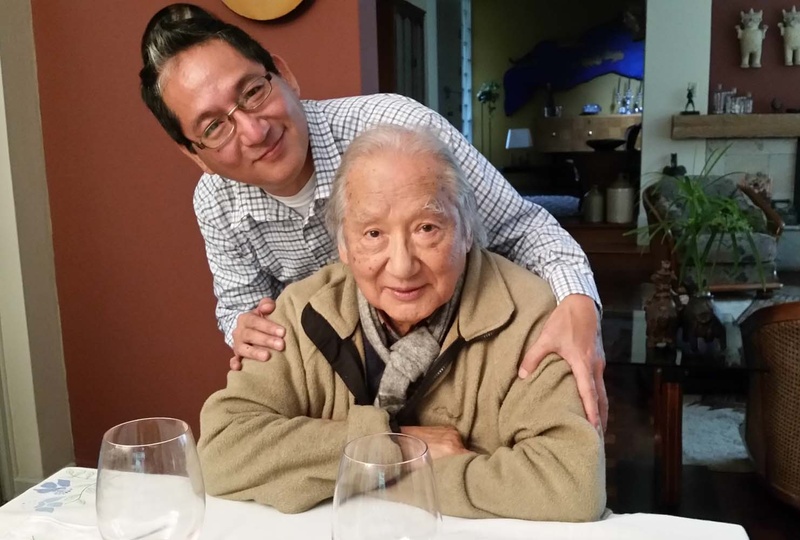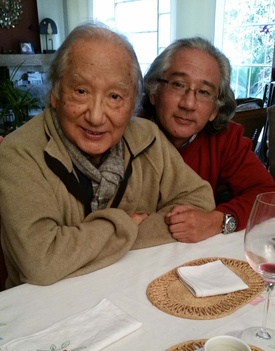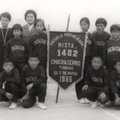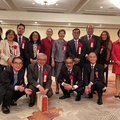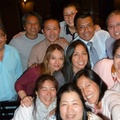A CONFLICT RESOLVED IN OLD AGE
When Venancio Shinki was a child, being of Japanese descent could be cause for ridicule, insults, or aggression. He suffered them and had a hard time assuming his identity.
Titi: I remember that my dad said that he had all the confusion of “what am I? Am I Peruvian or am I Japanese?” It is rich and at the same time difficult to be from both cultures. Only when he was old did he define himself as Peruvian. But it took him sixty years.
Iván: I remember that a lot because he repeated an anecdote to me many times. He must have been 40 years maximum. In one of the ceremonies that the Japanese ambassador performs in front of a group of important Nikkei for one of the anniversaries of the APJ (formerly the Central Japanese Society), the ambassador said: “It is a pleasure that you value Japanese ancestry, that you maintain the values, culture”, but he stressed: “You are Peruvians, you are not Japanese, you are descendants of Japanese.” The ambassador did not mean it in terms of “we do not want you to be Japanese, but rather to value Peruvian culture, to contribute to this country,” but it was also a warning. My dad told me: “Just in case, son, you are not Japanese, because the Japanese are not going to consider you Japanese.”
Titi: That's what my dad always said: “You are not Japanese in Japan, but you are not Peruvian in Peru either, you have to get used to those two things because you are neither Japanese nor Peruvian.”
Hugo: But in the end my dad himself said it: “We are Peruvians.” We are Peruvians with Japanese origin just as a descendant of Italian is Peruvian with Italian origin.
Titi: In any case, my dad was always very confused.
Iván: I think it is one of the big differences between the Nisei and the Sansei. We Sansei have it clear. I don't know any Sansei who has asked themselves the question: "Am I Japanese or am I Peruvian?" Every sansei assumes: “I am Peruvian and that's it.” The Nisei did ask themselves that question and that makes sense. We have it much easier than them. When we grew up and were adults, the neighborhood already had a reputation earned through hard work. Until before Fujimori, all Japanese were hard-working, intelligent and honest. Being Nikkei was: “Ah, you have to be intelligent, you have to be honest, you have to be hardworking.” There was no way to be a lazy, brothel-producing Nikkei. Of course they exist, but in the Peruvian imagination they did not exist, they were all good.
Hugo: The Nisei did suffer it in World War II. People told them, they spat in their faces, “you're not from here.” They did feel that they were stateless. On the other hand, we Sansei already have a birth certificate, DNI, the war had passed. Therefore, we have a little more of that feeling of belonging to Peru. My dad was rejected.
Ivan: The person of Japanese descent automatically receives some extra points simply for the history of the colony. But the Nisei received exactly the opposite: the negative charge. If he received that negative charge, it was logical that my dad would be confused. When you feel rejection from others, you do not identify with the people who reject you. You identify with the people who welcome you.
Titi: My dad always said that when he was a child he suffered a lot because he also felt the disdain of the Japanese because he was not completely Japanese. As a child, he suffered a lot because he was totally misplaced in the sense of belonging. That's why I tell you, it took my dad sixty years to at least identify who he really was.
Iván: When Grandpa Higa found out that my mother was dating an ainoko, a mestizo, his anger and annoyance was such that he threw an iron at my mother. “How can you think of being in love with an ainoko?” It sounds really silly now, but it was the way of thinking at the time. Not only are you not Peruvian nor are you Japanese, because in Peru you are Japanese and in Japan you are Peruvian, but on top of that, in Peru, among the Japanese, you are not completely well regarded either.
THE PAINTING MONK
Venancio Shinki always put art at the top of his podium. It was difficult for her children to accept, but time has a healing effect. Now they can talk about the subject without acrimony, even with laughter.
Titi: He recognized it, I'm not saying it, he always said that he relegated his children and his family to be an artist. The first priority in his life was not us, it was painting. Surely we in our subconscious have resented him at some point, but in the last twelve years, at the time he had heart surgery, we had a much more fluid relationship.
Iván: I remember a lot about the case of Hugo's marriage because there were many anecdotes there that are funny, but one that seemed crazy to me was my dad's annoyance that Hugo had gotten a partner who was an artist. He said: “How can you think of marrying an artist?” “Hey, dad, but you're an artist.” “Iván, there is no more selfish person on this planet than a visual artist.”
Hugo: He got together with a plastic artist.
Ivan: Precisely for that reason. Why do I end up becoming so fond of Elda? Because Elda sacrificed a large part of her personal life, her growth as a painter, she sacrificed many things because what my father did was: “I am the great artist and I concentrate on art, Elda takes care of everything else.” He found a person who would do everything for him. All. Paying the bills, finding staff, getting food, getting clothes, buying tickets, talking to gallery owners, everything that wasn't art. I mean, he did all the fun part. Elda stopped dedicating herself one hundred percent to her art because she dedicated herself one hundred percent to her partner.
Titi: His life was always me first, humanly it can hurt people, but it is a matter of understanding it. Those things don't hurt me because they already happened. I have ugly memories in that sense, but now they even make me laugh. I don't deny it.
Iván: The difference when you are 20 years old, 17, 15, from when you are 60, is that you have the background to understand the situation and you can accept your father for what he is. He is not a superhero, he is a human being, with his chiaroscuros. And you come to understand it. “That's how you were, I'm going to love you anyway, I'm going to respect you anyway.” I remember that once a journalist asked me (he was doing an interview with my dad and I was on the side): “If I asked you what the job of an artist's son is, what would it be?” I remember it came out: “The most important job of an artist's son is not to screw around” (laughs).
Hugo: He was a survivor. When you are older you understand that all that selfishness is the way of life of a survivor. A boy who suddenly, in a country like ours, in an eternal economic crisis, in a small town lost in a ravine in the mountains of Lima, at a few years old is left without a father and a few years later his mother dies. His father had a business in San Nicolás, but suddenly he was left without either of those two things. His mother started selling fried fish on the street and that was what they survived on. And then the mom dies and is left completely up in the air. He had uncles on his mother's side, but the uncles locked him up, took away everything he had and exploited him, and he escaped to the Isayama house (the family that took him in). If he wasn't selfish, he didn't eat. It was his way of life. You begin to realize that a surviving person has to have a certain amount of selfishness in order to survive. If not, he doesn't eat, he doesn't get ahead. So he learned those weapons.
The time he dedicated to painting was sacred.
Hugo: As a painter he isolated himself inside his house to paint. He always told me that every time someone called him on the phone I wasted his time painting.
Titi: He had a work schedule. It was excessively orderly.
Iván: One of the things that I remember most about my dad in not so nice terms was the fact that I wanted to visit him with the freedom with which you can visit your dad. But he was not free, he got upset, “I have to do this, that, I have to make an appointment.”
Hugo: The biggest order my dad had was the schedule. The schedule was infallible. Eight in the morning he was already standing, nine in the morning he was already sitting at his board sketching. Until lunch. The afternoons, nap, and then painting. He told me that inspiration coming to you at night is one of the biggest lies in the world. During the morning is where it occurs most because your brain has just rested. He told me: “That's why I sketch in the mornings, because in the afternoons it's a mechanical issue.”
Iván: Normally I worked three or four paintings at a time.
Hugo: In the mornings I sketched and sketched. While he painted on the canvas he copied the sketch, but he also improved the sketch. Sometimes he got stuck, but in order not to stop working and when he felt like he couldn't move forward any further, that the ideas weren't coming to him... He told me: "When I feel like that, I start with something new to refresh my head and keep moving forward." . The thing was to never stop and get up early to work. He became one of the greats of Peruvian painting because of that discipline. You can see it as selfishness in a Western society, but realize, when you become a monk of painting you dedicate yourself one hundred percent to painting and you have an iron discipline.
UNTIL THE LAST BRUSH STROKE
What was Venancio Shinki like beyond his status as a father and artist?
Titi: My dad was very tender, a very sweet person. People who love him and remember him always remember him as a very loving person. He always showed admiration for people.
Hugo: Once talking with (the painter) Gerardo Chávez and with Fernando Torres, who was director of the cultural part of the Peruvian North American Cultural Institute, the two agreed on something that I never realized. They told me: “If there is one virtue that your father had, apart from painting, as a human being, it is that he never gave up on anyone.” He never said anything bad about anyone.
Iván: My dad was a totally admirable person in the sense that at the beginning of the game someone was given a team that was worse than amateur and ended up winning a championship. That was my old man. He achieved what he achieved through his own efforts.
Titi: It had a lot of merit. If my dad were 25, 30 years old now, he would take on the world with the facilities he has now.
Iván: When my dad died, (there was) sadness and all that, but I always consoled myself with one thing, I have always thought the same thing: I would love an old age like his.
Titi: Yes.
Iván: He was recognized, he lived peacefully. He really had a good life.
Hugo: He earned it.
Iván: When you analyze that, you say: “Your life was great, old man,” because of the way he lived his last stage. And he died exactly how he said he wanted to die: painting. He didn't stop painting.
Titi: At the time my dad died he had two easels up and two paintings on them. Until the end he made every effort to put his last touch.
© 2017 Enrique Higa


